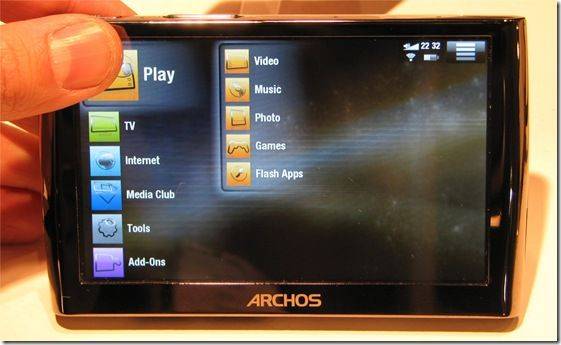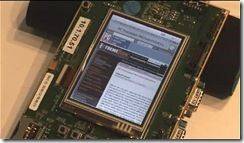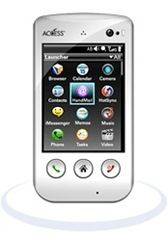
Posted on 31 October 2008
 Not content with having one of the most powerful ARM-based platforms out there, the Open Pandora team have decided to increase the RAM on the devices to accommodate Ubuntu after some successful tests by members of their community. (Video below)
Not content with having one of the most powerful ARM-based platforms out there, the Open Pandora team have decided to increase the RAM on the devices to accommodate Ubuntu after some successful tests by members of their community. (Video below)
“Expect to fly through the mobile Internet soon.” says one blog post. “RAM is very expensive but we have decided if we want a real ultra mobile PC style device which is pretty future proof for a few years we need it. Ubuntu is 20% faster already – not to mention you will be able to run several large apps now without worrying.” says a forum entry. It seems that adding Bluetooth to the spec wasn’t enough for the Open Pandora team. They want to add RAM, run desktop operating systems and take over the mobile Internet world. Well, sort of. It looks like there’s still a lot of work to do to get a decent OS and UI layer organised but judging by some of the passion in the forums, it shouldn’t take long.
I wonder if this is a response to the growing mobile Internet trend? Although the Pandora design may not be the most attractive due to its game controls, it wouldn’t take much to make a separate case for it if someone thought it was worth investing. Keep an eye on this grown-up smartphone because its looking more and more interesting by the day.
Fast forward to 2:30 for Firefox browsing action.

Posted on 16 September 2008
When I wrote about Opera 9.5 Mobile a short while back I highlighted how it was a great browser with no hardware to run it on. What I said was that the processing power and screen size wasn’t enough for the software. The user interface was good but in order for it to be taken seriously as a crossover mobile/desktop, entertainment/productivity browser, it needed better hardware so when we heard about the new Archos devices recently and their Cortex ARM general purpose processors we knew there was a chance for some serious challenges to the Intel-based MIDs. The Archos devices have a rich, enjoyable touch user interfaces, very good video performance (see video below) and a suite of content and application accessory offerings that can be bolted on to improve the package further. Add the possibility of getting a 3G-enabled version and you got the makings of what could be one of the best MIDs yet. [More after the pic…]

Read the full story

Posted on 02 September 2008
 Here’s another one of those ‘we can beat Atom’ tests where the fine detail of the result is irrelevant. The important thing here is that, like the VIA Nano comparison test, significant, market-changing progress has been made.
Here’s another one of those ‘we can beat Atom’ tests where the fine detail of the result is irrelevant. The important thing here is that, like the VIA Nano comparison test, significant, market-changing progress has been made.
I’ve been talking about ARM’s Cortex A8 for a while now and keeping an eye on it in terms of its suitability for Mobile Internet Devices. Its a powerful computing core and people like Ti are using it to build very small, power-efficient media and Internet-capable platforms. Apart from Pandora, we’ve seen it being promoted for use in OHA Android phones and even for netbooks.
But how fast is the Cortex A8? How fast would Firefox 3 run on a Cortex-based Android smartphone? And how accurate would it be? Intel keep pusing the ‘real internet’ and about how many errors you’ll find with smartphone browsers but when you’re running Firefox 3 on both platforms, the difference disappears. Intel also talking about speeds but when the processing power is the same on both hardware, that difference disappears too. ARM’s partners have already fought back against the Intel Atom machine a few times in the past (Nvidia here and here) but this video strikes right at the heart of Atom/Moblin. It shows Firefox 3 running at impressive speeds. Forget the normalised comparison at the end of the video, any browser that can average under 10 seconds per page as shown in this demo is going to be good enough for almost everyone. Its twice as fast as previous ARM-based devices and completely removes the 9-second disadvantage that I’ve talked about before. [see video below]
Read the full story

Posted on 05 August 2008
 Another one falls to the acronym!
Another one falls to the acronym!
Access, developers of one of the leading Linux-based mobile operating systems for mobile phones, the Access Linux Platform (ALP) has announced that its positioning its operating system for Mobile Internet Devices. The report comes via LinuxDevices but there’s a press release here.
ACCESS will be supporting the growth of the Mobile Internet Device (MID) market with the capability of running ACCESS Linux Platform on the emerging MID format, giving MID manufacturers the same complete, flexible, commercial-grade, Linux mobile platform available for mobile handsets to access a wide range of Internet and Web 2.0 services. The flexibility of ACCESS Linux Platform will enable licensees to create differentiated experiences, including UI innovations and support for larger displays.
ALP uses a NetFront browser layer which also supports frameless pages (widgets) that can be used as applications. This widget support and a widget community was also announced in the press release. I’ve used NetFront on a Sharp CL3200 before but that was a few years ago now. I’ve made a note to test it out as soon as I have the hardware available. It’s available here if you want to try it out on WM. Recent comments I’ve read suggest that its a high quality browser so if you try it out, let me know how it goes.
The report also says that Access will be demonstrating it’s Access Linux Platform on Cortex-based demonstrator boards. Now that’s something I’d really like to see, especially with that larger display but come on guys, demonstrators?

Posted on 21 May 2008
 The pricing game in the cheap notebook category getting rather silly. I’m seeing a lot of ‘tricks’ being used that will make it very difficult for consumers to sort the wheat from the chaff. The low-end Alpha 400 from Bestlink, a RISC-based Eee-a-like is another example. I’m not going to spend any time reporting details of the device (see LinuxDevices for that) or discuss whether it’s a good choice or not but I will report exactly what came into my mind when I read the news about it. Devices like these are nothing much more than smartphones running Linux and placed in notebook casings. I sound very negative when saying that but it shouldn’t be taken that way because while current solutions don’t provide enough oomph to give most users a serious alternative to a full notebook PC, they do show that we are moving to a point where the smartphone could be the only processing device you need. The idea of a smartphone running inside a notebook form factor really is a trick that needs to be observed. [Analysis after the break.]
The pricing game in the cheap notebook category getting rather silly. I’m seeing a lot of ‘tricks’ being used that will make it very difficult for consumers to sort the wheat from the chaff. The low-end Alpha 400 from Bestlink, a RISC-based Eee-a-like is another example. I’m not going to spend any time reporting details of the device (see LinuxDevices for that) or discuss whether it’s a good choice or not but I will report exactly what came into my mind when I read the news about it. Devices like these are nothing much more than smartphones running Linux and placed in notebook casings. I sound very negative when saying that but it shouldn’t be taken that way because while current solutions don’t provide enough oomph to give most users a serious alternative to a full notebook PC, they do show that we are moving to a point where the smartphone could be the only processing device you need. The idea of a smartphone running inside a notebook form factor really is a trick that needs to be observed. [Analysis after the break.]
Read the full story
 Not content with having one of the most powerful ARM-based platforms out there, the Open Pandora team have decided to increase the RAM on the devices to accommodate Ubuntu after some successful tests by members of their community. (Video below)
Not content with having one of the most powerful ARM-based platforms out there, the Open Pandora team have decided to increase the RAM on the devices to accommodate Ubuntu after some successful tests by members of their community. (Video below)
















